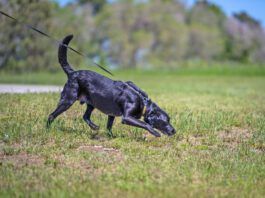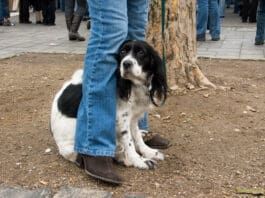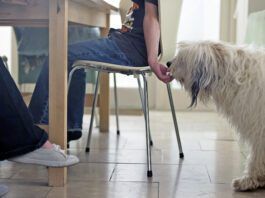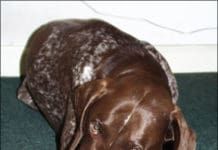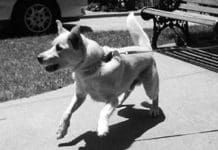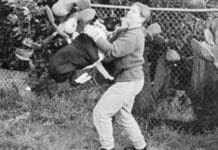Uncommonly Calm Canines
Most dog owners are pleased when their dogs are calm - even the owners of high-energy competition and working dogs, when those dogs are "off-duty." Some owners may go to great - sometimes misguided - lengths to achieve the coveted calm condition. Humans who understand the appropriate way to help a dog learn to be calm can make the difference between the canine companion who finds a lifelong loving home, and the one who ends up - sometimes several times in his life - gazing sadly out from the chain-link kennels of an animal shelter. Calm is a highly valued, hard-won, and sometimes transitory state in our own household. With four dogs in the Miller pack, two of them proud representatives of the herding group, calm is something we have to work at. We use the time-honored recipe of exercise, management, and training (and of course, lots of love) to help our canine family members be a peaceable pack.
Dogs and Puppies Chew For a Number of Reasons, Learn to Properly Channel This...
between three and six months of age. While the baby teeth are shedding and the adult teeth are erupting
Reducing Your Dog’s Anxieties
President Franklin D. Roosevelt, speaking about the Great Depression, said, We have nothing to fear but fear itself." If only it were that simple when dealing with dog behavior! Fear-related behaviors can be debilitating to the inappropriately fearful dog. They are heartbreaking
Does Your Dog Have an Eating Disorder?
Anorexia, bulimia, and weird pregnancy cravings are common in humans, but did you know dogs have eating disorders, too?
Involuntary Urination
When my dog Popcorn woke up one morning many years ago in a puddle of urine, I panicked, certain that only a deadly illness could cause this perfectly housetrained dog to wet her bed. I rushed her to the vet, where he did a thorough physical exam and urinalysis. I can still remember the relief I felt when my vet told me it appeared to be a simple case of incontinence. As it turns out, incontinence, which is defined as involuntary urination, is quite common in dogs, especially spayed females, where about one in five dogs (20 percent) is affected.
Signs That Your Dog Has Stress
Learn to recognize signs of (and then reduce) your dog's stress. If possible, remove the stressor from your dog's environment entirely. For example, if he's stressed by harsh verbal corrections, shock collars, and NASCAR races on TV, you can probably simply stop exposing him to them. For stressors that can't be eliminated, a long-term program of counter-conditioning and desensitization can change the dog's association with a stressor from negative to positive, removing one more trigger for stress signals and possible aggression.
When Your Dog Hates Being Touched
not training. Proceed more slowly
Causes of Reactive Dog Behavior and How to Train A Reactive Dog
“Reactive” is a term gaining popularity in dog training circles – but what is it, exactly? In her book Clinical Behavioral Medicine for Small Animals, Applied Animal Behaviorist Karen Overall, M.A., V.M.D., Ph.D., uses the term to describe animals who respond to normal stimuli with an abnormal (higher-than-normal) level of intensity. Take a deep breath and relax. We have positive training solutions for dogs who "go off" or "lose it" in certain circumstances.
TTouch Practitioners Explain Canine “Body Wrapping”
Body wrapping" dogs looks kooky
Living with a Difficult Dog
By your own standards, your dog’s life may not seem all that stressful – after all, he doesn’t have bills to pay, does he? But when you apply the more scientific definition of the word – anything that alarms or excites him, triggering his sympathetic nervous system into action and flooding him with the “fight or flight” chemicals adrenaline and noradrenaline – you may be able to see how many seemingly unrelated things in his environment actually contribute to his “misbehavior.”
Dealing With Submissive Urination
Submissive urination is a vexing challenge with some puppies and young dogs. Most grow out of it eventually, but in the meantime, how can you help your pup put a cork in it? In the canine world, when one dog wants to show deference to another, more dominant dog, he may urinate as a sign of submission. The more threatened he feels, the more likely he is to urinate. This is an involuntary reaction, an instinctive behavior that all dogs are born “knowing” how and when to exhibit. In a pack of dogs, this programmed behavior is a valuable survival mechanism. Puppies are extremely vulnerable to the wrath of adult dogs in the pack, and built-in submissive responses signal normal adult dogs to automatically shut off the aggression, thus keeping puppies from being hurt.
Upper-Level Management
Garbage-raiding, counter-surfing, barking at passers-by ... How do you train your dog to stop his bad behavior? Often, the answer isn’t a matter of training at all!




